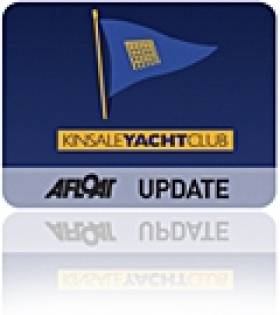Displaying items by tag: Shawn Kingston
Dragons Prepare for South Coasts in Kinsale
Kinsale Yacht Club hosts the Irish Dragon South Coast Championships from 10 - 12 September 2010.
A very competitive fleet of 18 Dragons will assemble in Kinsale this weekend for the final Championship of the Irish calendar with both the South Coast title and
valuable ranking points for both the World and European Championship qualification on offer.
Though this is a helmsman's championship the importance of an established and cohesive crew on a Dragon is crucial when determining favorites. Neil Hegarty, Peter Bowring and David Willams (Phantom) have excelled on the waters under the Old Head in recent years taking two consecutive National Championships in 2007 and 2009. However, they have always been pushed hard by Martin Byrne (Jaguar) who won the last edition of the South Coast Championships held in Kinsale in 2008 with his son Conor and constant collaborator Pedro De Andrade. Along with several other stellar teams from both the Royal St George and the Royal Irish, including current National Champion Don O'Donoghue (Seabird), is perennial favorite Simon Brien (Kin) from the Royal North of Ireland.
Kinsale Yacht Club has been selected to host the Dragon Gold Cup 2012 and the Kinsale Dragon fleet will be hoping to end the Dun Laoghaire domination of
recent years.
Olaf Sorensen, Martin Payne and Shawn Kingston (Christianna) will lead the challenge with Cameron Good, Henry Kingston and Simon Furney (Little Fella) another long-established team pushing hard for a breakthrough this year. Class Captain Anthony O'Neill with Donal Small and his son Eoghan (Tenacious) have sailed consistently well this season however; Tim Cronin, Caroline Matthews and Harry Lewis (Jee) have found a rich vein of form following a prolonged lay-off and could prove the surprise package.
The courses will be Windward-Leeward and six races will be sailed, with two races each day back to back. Friday promises very interesting conditions with fresh to strong southwesterly winds though the breeze set to moderate throughout the weekend. Principal Race Officer Alan Crosbie and his team will commence proceedings on Friday morning with another scintillating Dragon regatta in prospect.
- Martin Byrne
- Kinsale Yacht Club
- Irish Dragon South Coast Championships
- Neil Hegarty,
- Peter Bowring
- David Willams
- Pedro De Andrade
- Don O'Donoghue
- Simon Brien
- Olaf Sorensen
- Martin Payne
- Shawn Kingston
- Tim Cronin
- Caroline Matthews
- Harry Lewis
- Alan Crosbie
- Henry Kingston
- Cameron Good
- Simon Furney
- Dragon Gold Cup 2012





























































